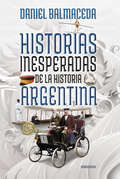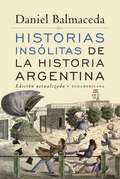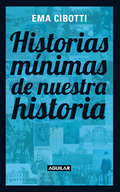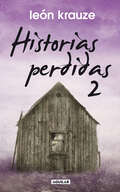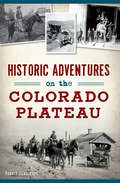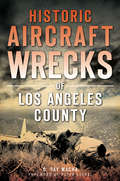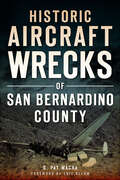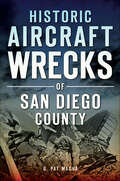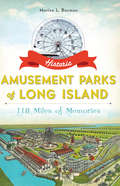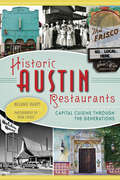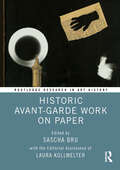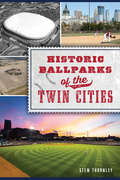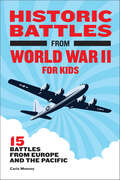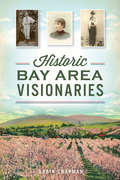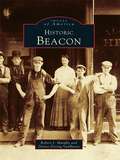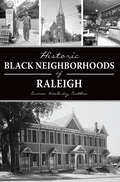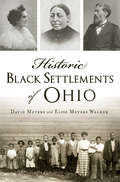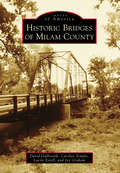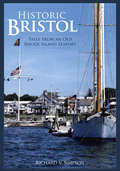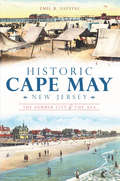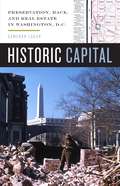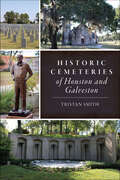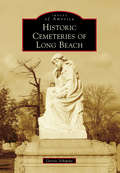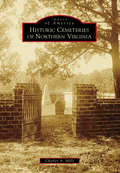- Table View
- List View
Historias inesperadas de la historia argentina: Tragedias, misterios y delirios de nuestro pasado
by Daniel BalmacedaLa historia argentina está repleta de personajes y situaciones increíbles, y quién mejor que Daniel Balmaceda para descubrir y contarnos con su prosa rigurosa y cálida estas historias insólitas. San Martín es dado por muerto cuatro años antes de fallecer. Avellaneda sale al balcón de la Casa Rosada para enfrentar a una multitud y lo ovacionan como si fuera Perón. Luis Viale escribe su página gloriosa en uno de los naufragios más absurdos. La madre de un presidente le impone una novia que él no quiere. Un ministro parece haber muerto en circunstancias muy comprometedoras, y un empresario cambió su testamento cuando ya estaba muerto. Como dice el mismo autor: «Muchos relatos de las "Historias inesperadas" parecen más adecuados al mundo de la ficción. Sin embargo, cada uno de ellos ha ocurrido y cualquier similitud con la historia real no es ninguna casualidad».
Historias insólitas de la historia argentina (Edición Actualizada)
by Daniel BalmacedaLa edición definitiva del libro más divertido que se haya publicadosobre historia argentina de los siglos XIX y XX. Daniel Balmaceda logra transmitir entusiasmo por la historia. Losveintitrés hijos de Urquiza; por qué la ex confitería Del Molino sellama así y qué tiene que ver con un francés que viajaba en globo; laprimera gobernadora de facto; corridas de toros en la 9 de Julio; lamaestra que inventó el guardapolvos blanco; cuando el zoológico era unapensión para Onelli y se fue a vivir allí; cuando Quinquela Martín niñopintaba con el carbón que vendía su padre adoptivo; el día que elpresidente Julio A. Roca fue guardavidas; quién fue el Rin Tin Tin denuestras pampas; la negra María Haedo de Acosta que murió a los 127años, son solo algunas de las anécdotas que recopila esta edición.
Historias mínimas de nuestra historia
by Ema CibottiLa historiadora Ema Cibotti rescata del olvido pequeñas historias que revelan una espesa trama de hechos menudos, muchas veces obviados que sin embargo son constitutivos de nuestro pasado. Nuestra nación puede compararse con un edificio en perpetua construcción. A lo largo de la historia se han ido levantando los cimientos, las columnas y las vigas, y su fachada suele variar de color según quién se haga cargo del relato. Pero para descubrir los ladrillos y el cemento que le dan significado y lo hacen habitable, esos relatos no son suficientes: es necesario acercarse, palpar los ladrillos y hurgar debajo de las muchas capas de pintura que los cubren. La historiadora Ema Cibotti agregó a sus conocimientos la búsqueda en cartas y memorias, en documentos oficiales y particulares, y con eso urdió estas pequeñas historias que revelan una espesa trama de hechos menudos, muchas veces obviados o directamente a punto de perderse en el olvido, que sin embargo son constitutivos de nuestro pasado, como lo son de ese edificio los ladrillos y el cemento. Los redactores de la Constitución en una tórrida aldea llamada Santa Fe; la declaración de amor de Carmen, la esposa del cacique Railef; más de sesenta ediciones de Anagnosia, el libro para aprender a leer que se vendía en el almacén; la verdadera revolución que avanzaba detrás de una zanja casi interminable; 459 diarios sostenidos por el ansia de información; tres seudónimos para una original operación literaria; la excluida población negra; mujeres maestras, mujeres periodistas, mujeres poetas, mujeres bandoneonistas; los protagonistas de un cuadro trágico; puchero, pizza y milanesas; un dandy en las filas de la democracia, son algunas de las historias que componen esta obra y que consolidan el edificio que seguimos construyendo. La crítica ha dicho... «La historiadora Ema Cibotti, sin demagogias discursivas ni afán de derribar próceres para ganarse a los detractores del sistema escolar, renueva la visión de la historia alumbrando rincones deliciosos y polémicos del escenario nacional.» Silvia Hopenhayn, La Nación
Historias perdidas 2
by León KrauzeCon estas historias de lo verídico y lo sobrenatural, León Krauze seduce y fascina. Raoul Wallenberg, salvador de muchísimas vidas durante la Segunda Guerra Mundial desapareció misteriosamente un día sin dejar el mínimo rastro; se habla con miedo y asombro de Pie Grande pero, en realidad existió o fue sólo producto de la imaginación extrema; por qué hasta nuestros días aterroriza hablar del Demonio de Nueva Jersey. Con el tono ameno y de sencilla erudición que lo caracteriza, León Krauze detalla los pormenores de éstas y más leyendas que nos turban y conmueven; comparte más sucesos enigmáticos que hablan de brujas, parajes encantados, travesías delirantes y celebridades de lo macabro, lo criminal y lo inimaginable. Los episodios de este libro transforman mitos e identidades, aclaran sucesos que se creían sepultados en el tiempo y hacen de la biografía de hombres condenados, motivo de la intriga y la revelación; así, descubrimos: qué perversidades desencadenaban las apariciones de la bruja Bell; cuál fue el destino final de aquellos presidiarios que abandonaron Alcatraz la noche del 11 de junio de 1962; los propósitos demenciales de Jack el Destripador, Edward Gein y Charles Manson, y cómo terminó sus días de gloria y grandeza Napoleón, abatido espiritualmente en Santa Helena. Historias perdidas 2 rescata de la bruma a Gengis Khan para indagar qué secretos oculta su sepulcro; hace aún más misteriosa la leyenda de Agatha Christie al hablar sobre su desaparición; perturba con el relato de la niña que resucita y se convierte en visionaria de la cultura egipcia o sacude los temperamentos con sus asombrosas deducciones sobre la leyenda de El Dorado.
Historias secretas de Córdoba
by Jorge CamarasaLos doce relatos que conforman este libro nos invitan a formar parte de este lugar de encuentro que es, también, un verdadero mundo dentro del mundo. Como pocos lugares en el mundo, Córdoba es un escenario por el que han pasado personajes sobresalientes y donde han transcurrido aco ntecimientos extraordinarios que son parte de la historia universal contemporánea. En un terreno transformado por los pueblos indígenas, por la llegada de los primeros adelantados españoles, por los jesuitas y por la formación de una incipiente oligarquía terrateniente, buscaron refugio -u olvido- inmigrantes, fugitivos, aventureros, místicos y ocultistas, criminales nazis y exiliados de la España franquista, millonarios, artistas, perseguidos políticos, santos y asesinos. Mientras nos guía por los altibajos de su geografía incomparable, Jorge Camarasa nos enseña los lugares donde transcurrió la infancia de Ernesto "Che" Guevara, los paisajes que vio Eva Duarte cuando filmaba la película que el peronismo prefirió ocultar, los hoteles donde el mismísimo Adolf Hitler habría sido visto, el pueblo ausente al que habría llegado Pablo Neruda. O nos cuenta cómo el cerro Uritorco ha convocado a 10 largo de los tiempos toda clase de excursiones místicas: templarios, sociedades secretas, buscadores de ovnis, sectas, grupos newage; todos congregados alrededor de esta montaña mágica que aún hoy sigue dando que hablar. Historias de mujeres y hombres que han volado los cielos, atravesado océanos y cruzado montañas, movidos por el amor, la fe, la pasión o la muerte, los doce relatos que conforman este libro nos invitan a formar parte de este lugar de encuentro que es, también, un verdaderomundo dentro del mundo.
Historic Adventures on the Colorado Plateau (Transportation)
by Bob SilbernagelThe Colorado Plateau is home to nearly thirty national parks, monuments and recreational areas. The unique geology, stunning rock formations, powerful rivers and numerous scenic canyons that compose such a striking region also made navigation difficult. Yet daring explorers braved the journey. Rock art and other artifacts are evidence of occupation thousands of years ago. Spanish explorers once trekked across this rugged terrain, seeking information on the native populace, religious converts and trade routes. In the frontier era, a trio of bandits discovered the value of good horses while fleeing for three hundred miles. Nearly a century after the gold rush, uranium fever brought another boom to the rugged reaches of the area in the 1940s. Supported by years of research, Bob Silbernagel traces the Colorado Plateau's intrepid inhabitants throughout history.
Historic Aircraft Wrecks of Los Angeles County (Disaster)
by G. Pat MachaA century of aviation research and military flights over Los Angeles County has left the San Gabriel Mountains, Mojave Desert and the near-shore Pacific Ocean strewn with more than 1,500 aircraft crash sites. Barnstormers and test pilots too often made unexpected final landings. Accidents occurred on a nearly daily basis during World War II training maneuvers. Private planes, a sign of 1950s prosperity, also met tragic ends. These epic incidents include the 1971 tragedy of Flight 706 in which an airliner collided with a marine fighter jet above Mount Bliss, killing fifty people. Renowned aircraft crash search specialist G. Pat Macha recounts dozens of sorrowful, triumphant and surprising true stories of those who lived through these ordeals while offering touching tributes to those who did not.
Historic Aircraft Wrecks of San Bernardino County (Disaster)
by G. Pat MachaWeather, darkness and twists of fate have contributed to more than three hundred airplane crashes in San Bernardino County, California. Many of these accidents occurred in the vast Mojave Desert, others on the cloud-shrouded, snow-capped mountains of the largest county in the lower forty-eight states. Searches often were labored yet fruitless, even for the privileged: Frank Sinatra's mother perished here in a downed plane. The quest for an aircraft containing $5,000 in cash has become the stuff of legend. Tales of survival in uninhabited, rugged landscapes have been especially harrowing. Join renowned aircraft-crash search specialist G. Pat Macha for dozens of sorrowful, triumphant, touching and surprising true stories of those who lived through the ordeals of plane crashes--and others who didn't.
Historic Aircraft Wrecks of San Diego County (Disaster)
by G. Pat MachaClear weather and a natural harbor made San Diego an early aviation hub, but success in flight came with devastating tragedies. The remains of more than four hundred aircrafts lie scattered across the county's deserts and mountains. Experts estimate that dozens more are on the ocean floor off the coast. In 1922, army pilot Charles F. Webber's DeHavilland biplane went missing over Cuyamaca Rancho State Park. In 1978, Pacific Southwest Airlines Flight 178 collided midair over San Diego and crashed in the residential North Park neighborhood, claiming the lives of 144 people in what was the worst airline disaster of the era. Author and aircraft accident research specialist G. Pat Macha recounts these and other stories of astonishing survival, heroism and heartbreaking fatality.
Historic Amusement Parks of Long Island: 118 Miles of Memories
by Marisa L. BermanWhen Long Island became a suburban paradise after World War II, ambitious entrepreneurs created dozens of amusement parks to help families unwind. The Nunley family built a park in Baldwin in 1939, and it was so successful that they opened Nunley's Happyland in Bethpage just a few years later. Westbury's Spaceland fascinated youngsters with dreams of becoming astronauts, and Frontier City in Amityville was heaven on earth to fans of the Wild West. Today, historic parks like Deno's Wonder Wheel Park in Coney Island and Adventureland in Farmingdale still delight children and remind parents of happy memories of their own. Local author Marisa Berman explores the decades of fun and laughter from Long Island's historic amusement parks.
Historic Austin Restaurants: Capital Cuisine through the Generations (American Palate)
by Melanie HauptAustin has staked its claim as the seat of innovative culinary movements, and its food culture mirrors the transformations taking place across the city. The evolution of the east side is reflected in joints like Franklin Barbecue, while landmarks like Scholz Garten, the oldest restaurant in the capital, testify to the contributions of the town's college presence and a healthy German influence. Joe's Bakery isn't just one of the town's most beloved Tex-Mex spots; it's the place where the real wheeling and dealing in Texas politics happens. Food writer Melanie Haupt samples Austin's iconic restaurants and the rich heritage that produced them.
Historic Avant-Garde Work on Paper (Routledge Research in Art History)
by Sascha Bru Laura KollwelterThis book examines the many functions of paper in the fine art and aesthetics of the early twentieth-century modernist or historic avant-garde (Expressionism, Cubism, Futurism, Dadaism, Surrealism, Constructivism and many more).With its many collages and photomontages, the historic avant-garde is generally considered to have transformed paper from a mere support into an artistic medium and to have assisted in art on paper gaining a firm autonomy. Bringing together an international team of scholars, this book shows that the story of paper in the avant-garde has thereby hardly been told. The first section looks at a selection of canonized individual avant-gardists’ work on paper to demonstrate that the material and formal analysis of paper in the avant-garde’s artistic production still holds much in store. In the second section, chapters zoom in on forms and formats of collective artistic production that deployed paper to move around reproductions of fine art works, to facilitate the dialogue between avant-gardists, to better promote their work among patrons, and to make their work available to a wider audience. Chapters in the third section lay bare how certain groups within the avant-garde began to massively create monochrome works, because these could be easily reproduced when transferred to, or reproduced as, linocuts. In the last section of the book, chapters explore how the avant-garde’s attentiveness to paper almost always also implied a critique of the ways in which paper, and all that it stood for, was treated and labored in European culture and society more broadly.The book will be of interest to scholars working in art history, modernism, and design.
Historic Ballparks of the Twin Cities (Sports)
by Stew ThornleyFrom the rickety to the palatial, ballparks have grown up with and defined baseball in Minneapolis and St. Paul. Some old-timers have vivid memories of cheering for Willie Mays and Roy Campanella at Nicollet and Lexington. Others marveled at a majestic Killebrew home run at the Met. Many a lucky resident celebrated two world championships in the Metrodome and witnessed one of the greatest pitching performances in World Series history. More recently, fans have enjoyed the return of sunshine and even raindrops at Target Field. Described by City Pages as "the most respected local baseball historian," Stew Thornley leads a tour of where we--as well as our grandparents and now our children--discovered baseball.
Historic Battles from World War II for Kids: 15 Battles from Europe and the Pacific (Historic Battles for Kids)
by Carla MooneyAn up-close look at the battles of World War II for kids ages 8 to 12Help kids learn all about World War II—right from the front lines. This fascinating guide focuses on the battles that decided the outcome of the war. Each entry puts kids directly in the general's seat, walking them through the flow of battle as well as the strategies, tactics, and technology that made the difference between victory and defeat.Go beyond other World War 2 books for kids with:15 key conflicts—Kids will dive deep into well-known and lesser-explored battles alike, from the Attack on Pearl Harbor to the Battle of Crete.Battlefield basics—Each chapter starts off a quick breakdown of the battle, including dates, objectives, and what was at stake.Closer looks—Young learners will find out even more with the help of technological explorations, battle maps, by-the-numbers sidebars, and more.Give kids an exciting new perspective on World War 2 history!
Historic Bay Area Visionaries (American Chronicles)
by Robin ChapmanFor centuries, California's environment has nurtured remarkable people. Ohlone Lope Inigo found a way to protect his family in troubled times on the shores of San Francisco Bay. Pioneer Juana Briones made a fortune from her rancho yet took the time to care for those in need. Innovator Thomas Foon Chew discovered a climate for success, in spite of the obstacles. Around the region that became Silicon Valley, filmmaker Charlie Chaplin found inspiration, poet Robert Louis Stevenson uncovered adventure and Sarah Winchester built a house that would intrigue people long after she was gone. Author Robin Chapman shares fascinating tales of those who exemplify the enterprising spirit of the Golden State.
Historic Beacon (Images of America)
by Denise Doring Vanburen Robert J. MurphyResidents of Beacon, New York, are justifiably proud of a community that is rich in history and promise. In this exquisite collection of images, local historians Robert J. Murphy and Denise Doring VanBuren uncover the fascinating past of Beacon andthe people who have called it home. The community's earliest permanent European settler was Madam Catheryna Rombout Brett, whose c. 1709 home is preserved within the city as the the oldest building in Dutchess County. Within the vicinity of the Madam Brett Homestead, two distinct villages grew: Matteawan, a manufacturing community at the foot of the mountain, and Fishkill Landing, a Hudson River port. Both villages prospered and eventually merged in 1913. Through the decades, the community was hailed as a model of a successful manufacturing center and became the location for several significant Hudson River estates. It played host to one of the longestrunning ferries in American history and introduced one of the first electric streetcar systems in the Hudson River Valley. Perhaps its most well-known feature was the Mount Beacon Incline Railway, a feat of engineering documented as the world's steepest incline railroad.
Historic Black Neighborhoods of Raleigh (American Heritage)
by Carmen Wimberley CauthenThe story of Raleigh's African American communities begins before the Civil War.Towns like Oberlin Village were built by free people of color in the antebellum era. During Reconstruction, the creation of thirteen freedmen's villages defined the racial boundaries of Raleigh. These neighborhoods demonstrate the determination and resilience of formerly enslaved North Carolinians. After World War II, new suburbs sprang up, telling tales of the growth and struggles of the Black community under Jim Crow. Many of these communities endure today. Dozens of never before published pictures and maps illustrate this hidden history.Local historian Carmen Wimberly Cauthen tells the story of a people who--despite slavery--wanted to learn, grow, and be treated as any others.
Historic Black Settlements of Ohio
by David Meyers Elise Meyers WalkerIn the years leading up to the Civil War, Ohio had more African American settlements than any other state. Owing to a common border with several slave states, it became a destination for people of color seeking to separate themselves from slavery. Despite these communities having populations that sometimes numbered in the hundreds, little is known about most of them, and by the beginning of the twentieth century, nearly all had lost their ethnic identities as the original settlers died off and their descendants moved away. Save for scattered cemeteries and an occasional house or church, they have all but been erased from Ohio's landscape. Father-daughter coauthors David Meyers and Elise Meyers Walker piece together the stories of more than forty of these black settlements.
Historic Bridges of Milam County (Images of America)
by Lucile Estell Carolyn Temple David Galbreath Joy GrahamMilam County, located in the heart of Central Texas, is home to 18 historic bridges that were constructed through the years to accommodate the growth of the county. One bridge, Worley Bridge, has been fully restored in a cooperative effort between Milam County and the Texas Department of Transportation (TXDOT). TXDOT is an important partner in the preservation of these historic structures. Memories of some bridges will be preserved in a bridge park, which is being constructed in Rockdale. Other bridges simply stand in mute testimony to the passing of time and the changing of human needs and habits. This book tells the story of these bridges and their important role in our history. It provides knowledge and understanding of these structures.
Historic Bristol: Tales from an Old Rhode Island Seaport
by Richard V. SimpsonAuthor Richard V. Simpson (who also penned Herreshoff Yachts) offers up a diverse sampling of fascinating and entertaining stories that explore Bristol's every facet from early investigations into possible Viking settlements on the peninsula to the nationally famous Fourth of July celebration, and from the antics of local politicians to the yachts and sailors that have brought the town glory and renown.
Historic Cape May, New Jersey: The Summer City by the Sea
by Emil R. SalviniCape May began as Cape May Island, where families journeyed to enjoy wide white beaches and gentle surf during the early nineteenth century. With the advent of steamships and railroads, the quiet village soon became America's first seaside resort town. Despite its charm and elegance, visitors slowed in the 1880s, as a series of mysterious fires claimed some of its most beloved structures. As the twentieth century dawned, Cape May's failure to modernize ultimately became its salvation. By the 1960s, visitors were once again flocking to this seaside destination to enjoy its quaint Victorian charm. Experience the elegant Chalfonte Hotel, stately Congress Hall and the classic Cape May Boardwalk with local historian Emil Salvini.
Historic Capital: Preservation, Race, and Real Estate in Washington, D.C.
by Cameron LoganWashington, D.C. has long been known as a frustrating and sometimes confusing city for its residents to call home. The monumental core of federal office buildings, museums, and the National Mall dominates the city&’s surrounding neighborhoods and urban fabric. For much of the postwar era, Washingtonians battled to make the city their own, fighting the federal government over the basic question of home rule, the right of the city&’s residents to govern their local affairs. In Historic Capital, urban historian Cameron Logan examines how the historic preservation movement played an integral role in Washingtonians&’ claiming the city as their own. Going back to the earliest days of the local historic preservation movement in the 1920s, Logan shows how Washington, D.C.&’s historic buildings and neighborhoods have been a site of contestation between local interests and the expansion of the federal government&’s footprint. He carefully analyzes the long history of fights over the right to name and define historic districts in Georgetown, Dupont Circle, and Capitol Hill and documents a series of high-profile conflicts surrounding the fate of Lafayette Square, Rhodes Tavern, and Capitol Park, SW before discussing D.C. today.Diving deep into the racial fault lines of D.C., Historic Capital also explores how the historic preservation movement affected poor and African American residents in Anacostia and the U Street and Shaw neighborhoods and changed the social and cultural fabric of the nation&’s capital. Broadening his inquiry to the United States as a whole, Logan ultimately makes the provocative and compelling case that historic preservation has had as great an impact on the physical fabric of U.S. cities as any other private or public sector initiative in the twentieth century.
Historic Cemeteries of Houston and Galveston (Landmarks)
by Tristan SmithAuthor Tristan Smith offers an insightful guide through two dozen of Houston and Galveston's most historic cemeteries. Houston and Galveston's historic cemeteries lie scattered amongst the neighborhoods and thoroughfares of the nation's fourth largest city. Some of these portals to the past nestle in hidden pockets of the bustling metropolis. Other cemeteries carve out the kind of contemplative sanctuary that rivals the city's largest greenspaces. Explore the burial grounds around the Bayou City, where astronauts, musicians, movie stars and civic leaders rest alongside rogues, scoundrels and murderers.
Historic Cemeteries of Long Beach (Images of America)
by Gerrie SchipskeThe stories of those who lived in the city by the sea begin long before the 1878 date on the oldest headstone found in the city. Long Beach was the site of ceremonies, and perhaps the burial grounds, for the Tongva tribe. Many of those who later settled the city are buried in one of the four known cemeteries, Municipal, Sunnyside, Forest Lawn Long Beach, and All Souls. Two of the cemeteries hold the graves of several hundred Union and Confederate Civil War veterans, one Medal of Honor recipient, and a slave who served in the 1st Colored Heavy Artillery Regiment. The histories of the Municipal and Sunnyside Cemeteries include the 1921 discovery of oil, which made national news as descendants of the deceased fought for the oil underneath the graves. The fight resulted in a second Sunnyside Cemetery that later became Forest Lawn Long Beach. The scene of oil derricks surrounding the cemeteries was so surreal that it caught the attention of Ansel Adams, whose photographs of Sunnyside Cemetery are included.
Historic Cemeteries of Northern Virginia
by Charles A. MillsNorthern Virginia's cemeteries are time capsules reflecting the region's 350 years of history. They offer a glimpse into the lives and fortunes of the famous, the infamous, and those who are remembered for loving their families, tending to their business, and quietly supporting their communities. There are some 1,000 cemeteries in Northern Virginia, ranging from small family plots to huge national cemeteries covering hundreds of acres. This book presents the history of the region through the medium of cemeteries. Every gravestone has a story to tell. Confederate raiders, freedmen, eccentrics, and nation builders lived and died in Northern Virginia. Sometimes, tombstones are all that remain of their stories. Often, finding their tombstones is the first step in rediscovering the stories of these figures.
